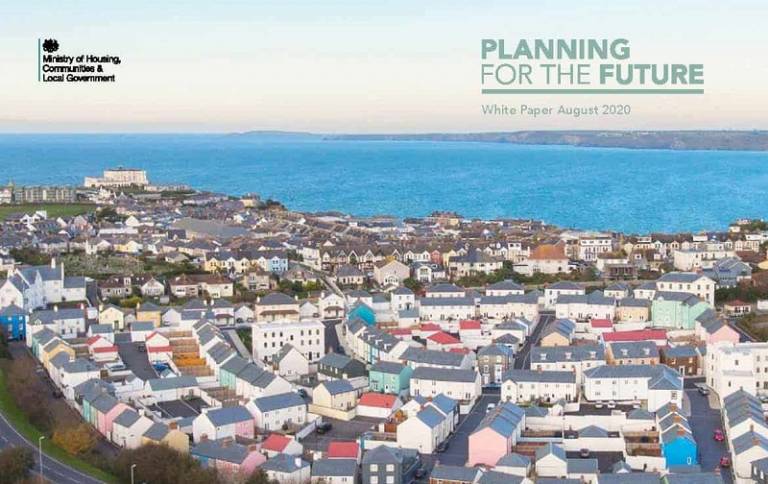Bartlett School of Planning Academics Respond to the Government’s White Paper Consultation
28 October 2020
In August, the government published Planning for the Future, a white paper proposing radical reform of the planning system in England. Today, 19 staff from the Bartlett School of Planning, UCL, have submitted a response to the consultation on these proposals.

The detailed response, drawing on the collective expertise of academics researching planning, housing, real estate, urban design and related issues, notes that the current system is far from perfect and that there are things to commend in Planning for the Future including interesting suggestions around the better use of technology and data in improving the experience of planning and ways to secure better design outcomes. There are also proposals, such as around a more standardised approach to planning gain, which have the potential to be beneficial albeit in many cases further detail is required to fully judge the practicality and impact of reforms.
There is strong concern in the consultation response, however, about many of core ideas, which seem to flow from a reductionist view of planning and an over-simplistic understanding of the ‘housing crisis’. Many of the big issues – should we move to a rules-based system and ration opportunities for democratic input and discretion; should the system focus largely on the licensing of housing development; should the climate emergency, and planning’s critical role in addressing it, be relegated behind a growth focus – seem to fall between the cracks that are all too obvious in the consultation.
Furthermore, rather than offering a formula for simplified planning, international experience suggest a rules-based and codified approach will likely be difficult to implement, and slow and complex to operate. The insistence that plans are produced in 30 months will place new strains on local authorities and communities, who are likely to share new frustrations over the operation of the system, particularly given the history of under-resourcing planning reform.
Dr Ben Clifford, who coordinated the UCL response (along with Professors Nick Gallent and Yvonne Rydin) commented:
“Whilst the white paper does identify some areas of possible improvement for the planning system in England, such as an increased focus on design outcomes, at its core are proposals which could undermine the democracy which should be inherent in a system which manage changes in the built and natural environment impacting us all.
The discretionary system currently in place has advantages as well as disadvantages, and the potential of flexibility alongside clarity from full local plan coverage is not properly considered in the proposals. The example of permitted development for change of use from commercial to residential shows the potential dangers of a more codified, as-of-right approach to managing development.
The white paper also fails, perhaps unsurprisingly, the acknowledge that many of the problems with the planning system are related to a decade of under-investment and incoherent reform. Instead of ripping up the core tenants of our planning approach, we need instead to improve the strategic capacity of the current system, and allow it to take and have a broader and more confident view of its ability to deliver spatial justice and sustainability.”
- The full Bartlett School of Planning response to the government’s consultation can be viewed HERE.
- A summary of this response is also available HERE.
The response was submitted on behalf of the following Bartlett School of Planning scholars:
- Dr Lauren Andres,
- Professor Matthew Carmona,
- Dr Ben Clifford,
- Professor Claudio De Magalhaes,
- Dr Dan Durrant,
- Professor Michael Edwards,
- Dr Jessica Ferm,
- Dr Sonia Freire Trigo,
- Dr Tommaso Gabrieli,
- Professor Nick Gallent,
- Dr Iqbal Hamiduddin,
- Dr Katayoun Karampour,
- Dr Susan Moore,
- Professor Janice Morphet,
- Dr Lucy Natarajan,
- Professor Yvonne Rydin,
- Dr Pablo Sendra,
- Dr Michael Short,
- Dr Catalina Turcu.
 Close
Close

